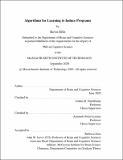Algorithms for learning to induce programs
Author(s)
Ellis, Kevin,Ph. D.(Kevin M.)Massachusetts Institute of Technology.
Download1241081869-MIT.pdf (14.95Mb)
Other Contributors
Massachusetts Institute of Technology. Department of Brain and Cognitive Sciences.
Advisor
Joshua B. Tenenbaum and Armando Solar-Lezama.
Terms of use
Metadata
Show full item recordAbstract
The future of machine learning should have a knowledge representation that supports, at a minimum, several features: Expressivity, interpretability, the potential for reuse by both humans and machines, while also enabling sample-efficient generalization. Here we argue that programs-i.e., source code-are a knowledge representation which can contribute to the project of capturing these elements of intelligence. This research direction however requires new program synthesis algorithms which can induce programs solving a range of AI tasks. This program induction challenge confronts two primary obstacles: the space of all programs is infinite, so we need a strong inductive bias or prior to steer us toward the correct programs; and even if we have that prior, effectively searching through the vast combinatorial space of all programs is generally intractable. We introduce algorithms that learn to induce programs, with the goal of addressing these two primary obstacles. Focusing on case studies in vision, computational linguistics, and learning-to-learn, we develop an algorithmic toolkit for learning inductive biases over programs as well as learning to search for programs, drawing on probabilistic, neural, and symbolic methods. Together this toolkit suggests ways in which program induction can contribute to AI, and how we can use learning to improve program synthesis technologies.
Description
Thesis: Ph. D. in Cognitive Science, Massachusetts Institute of Technology, Department of Brain and Cognitive Sciences, September, 2020 Cataloged from student-submitted PDF version of thesis. Includes bibliographical references (pages 213-224).
Date issued
2020Department
Massachusetts Institute of Technology. Department of Brain and Cognitive SciencesPublisher
Massachusetts Institute of Technology
Keywords
Brain and Cognitive Sciences.